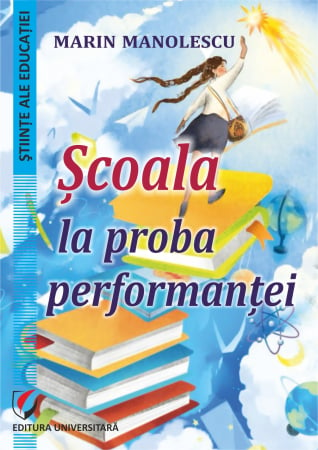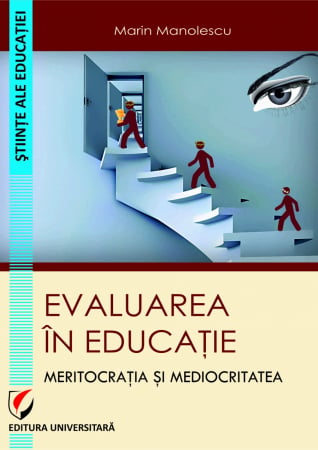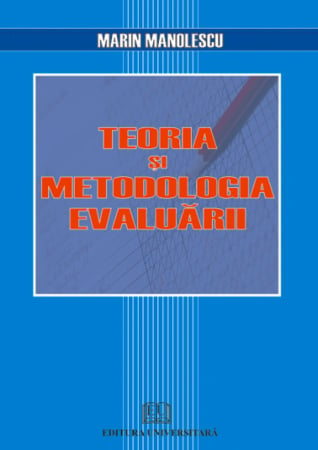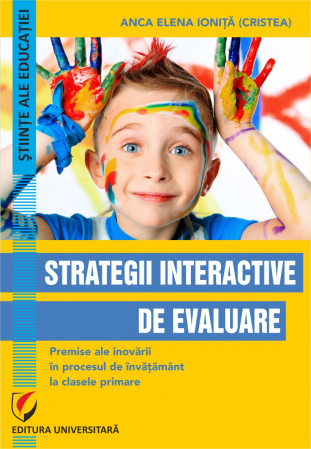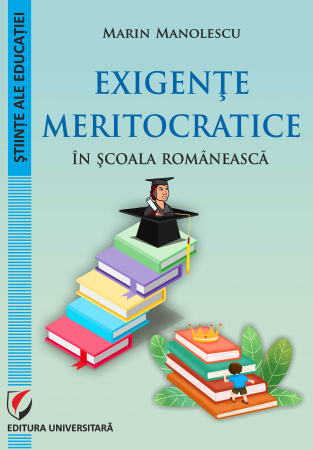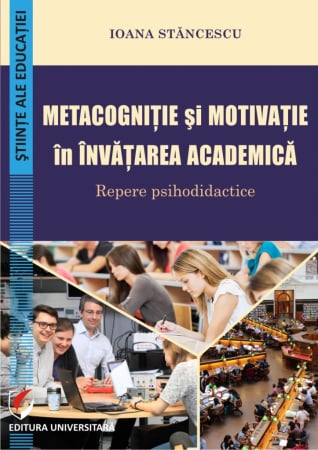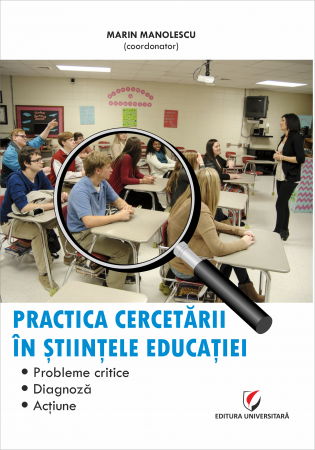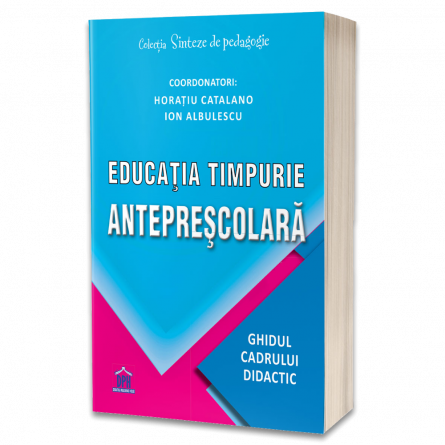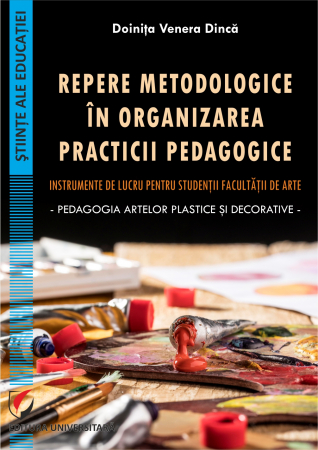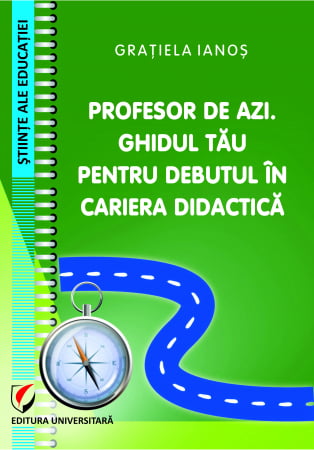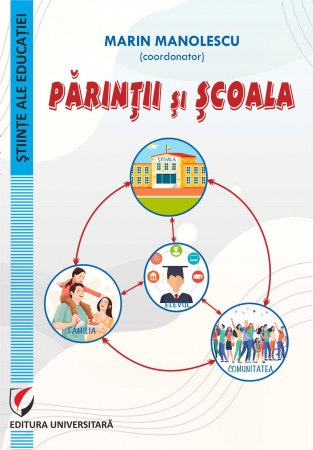Manuscript proposals: [email protected] / 0745 204 115 //// Tracking orders Individuals / Sales: 0745 200 357 / Orders Legal entities: 0721 722 783
6359.png) Co-creation pedagogy. Ideas for learning activities and tools for teacher training - Loredana Manasia, Maria-Gratiela Ianos
Co-creation pedagogy. Ideas for learning activities and tools for teacher training - Loredana Manasia, Maria-Gratiela Ianos
6359.png)
ISBN: 978-606-28-1474-8
DOI: https://doi.org/10.5682/9786062814748
Publisher year: 2022
Edition: I
Pages: 174
Publisher: Editura Universitară
Author: Loredana Manasia, Maria-Gratiela Ianos
Product Code:
9786062814748
Do you need help?
0745 200 357
- Description
- Authors
- Content
- More details
- Reviews (0)
The knowledge society is evolving towards a learning society in which co-participation in learning, collaborative knowledge management and information dissemination are essential vectors of success. There is also a growing recognition that it is not only necessary to move closer to the core of teaching and learning, but that there should be a widespread willingness to innovate.
This paper, a collection of activities with the role of cognitive, emotional-emotional, social and action stimulation, presents a series of thematically organized learning activities that can be used in initial and in-service teacher training programs.
This paper, a collection of activities with the role of cognitive, emotional-emotional, social and action stimulation, presents a series of thematically organized learning activities that can be used in initial and in-service teacher training programs.
LOREDANA MANASIA
MARIA-GRATIELA IANOS
MARIA-GRATIELA IANOS
CONTENTS / 5
ACKNOWLEDGMENTS / 11
INTRODUCTION / 13
PREPARATION FOR THE TEACHING CAREER / 15
Theme summary / 15
Professionalism of teaching staff / 16
The Talking Man "talks" about the model teacher / 22
Me, in the role of a teacher! / 22
Transformative experiences / 23
He called me Malala / 24
Areas of competence, roles and responsibilities of the teacher / 25
The matrix of roles and responsibilities of the teacher / 27
Two truths and a falsehood! / 28
Educational projects - examples of good practices and recommendations / 29
How to formulate SMART objectives for educational projects / 31
Objectives and activities in educational projects / 33
Societal challenges and projects / 34
Word game / 36
Other key concepts / 36
Missions and roles of the school / 36
THE ROLE OF THE SCHOOL AS AN ACTOR OF THE EDUCATIONAL COMMUNITY AND SOCIAL ECOSYSTEMS / 38
Theme summary / 38
Education as the essential resource in the development of communities / 39
Education, individual and community development / 42
School dropout: a school or community problem? / 42
Poverty in learning - a challenge of the modern world / 43
Social integration of vulnerable children / 43
Case study – Braila phenomenon / 46
The Mmogo method for co-creating learning experiences through visual approaches / 47
The economy based on knowledge and the missions of educational institutions / 50
Missions and roles of the school / 52
Manifest and latent functions of the school: equal opportunities and gender / 53
The role of the school in community regeneration / 54
Complementary roles of the school and the teacher / 55
Specific activities of the school organization / 56
Managerial and organizational development activities / 56
Didactic activities / 58
Complementary activities / 59
Extracurricular activities / 59
Relevant documents in the activity of teaching staff / 60
Waves of activities / 61
Let's go on a trip! / 63
Activities for parents / 63
Reading with parents / 64
What do we communicate to parents? / 65
Communication plan in the relationship with parents / 66
STEM Club / 66
Robingo / 67
Snow globes for any season / 68
OPPORTUNITIES TO CO-CREATE WITH THE COMMUNITY: LEARNING THROUGH SERVICES / 70
Summary of section / 70
Service learning as a method of co-creation / 70
Design principles of service learning / 72
Communities, partnerships and people as pillars of service learning / 73
Clusters of principles in the design of learning through services / 73
Principles in relation to Cluster 2 / 76
Tools for service learning / 79
START / 79 sheet
PLAN / 80 sheet
Fisa LUCREAZA / 80
The sheet REFLECTEAZA / 81
FOCUS ON THE DESIGN OF LEARNING EXPERIENCES / 84
Learning patterns in higher education / 84
Concepts about learning / 89
Learning in the mirror / 90
Learning strategies / 90
The design of learning experiences / 91
Design sheet of a learning activity / 94
Learning experiences / 96
About Bloom, taxonomy of objectives and operationalization / 96
Operational objectives of the lesson and learning outcomes / 97
Sequencing the lesson / 97
Instructional strategies / 98
Scenarios and challenges / 100
Let's help Mr. Stiintescu! / 101
Alternatives / 101
School of didactic magic / 104
Myths about the differentiation of instruction / 105
Curious and Talkative / 106
Speech bubbles / 106
The concept of didactic transposition / 107
Quark Cautarescu's story / 107
How does the school curriculum achieve didactic transposition? / 108
Content modeling / 108
Intruders / 109
Why did R. Feynman become famous? / 113
Let's play Devil's Advocate! / 114
Main curricular products – Teacher's curricular products / 115
Relating learning activities to contents / 117
FORMATIVE ASSESSMENT – TECHNIQUES, ACTIVITIES, TOOLS / 118
Formative evaluation as the practice of co-creating learning experiences / 118
Self-evaluation / 119
Evaluation strategies / 120
Inspirescu, Pozitescu and Negativescu / 121
Clouds of ideas / 126
The stone bridge / 127
ORGANIZATION OF PEDAGOGICAL PRACTICE / 128
Section summary / 128
Lesson observation sheet / 128
Instructions for completing observation sheets / 128
Template for observation sheet / 129
Lesson projects / 131
Recommendations regarding lesson design / 131
Project lesson / 133
Lesson self-analysis sheets / 135
Completion instructions / 135
Template for the self-analysis sheet of the lesson / 136
Reflective Journal / 140
Pedagogical practice portfolio / 141
Evaluation criteria of the pedagogical practice activity of master's students / 141
Summary of section / 143
Potatoes are better hot / 143
Let's pull the strings / 143
Snakes and ladders / 144
Memories of the future / 145
Personal branding / 145
Books, books and ... happiness / 147
Where are you hiding / 148
The behavioral echo / 148
A chain of happiness / 149
The secrets of gratitude / 149
Mathematics of smiles / 150
We are our best investment! / 150
Musical hugs / 151
Teacher's heart / 152
The elephant in the room / 152
Personal coat of arms / 153
What matters! / 153
Didactic tie / 154
10 words, not 1000 / 154
Challenge to reflection - dynamization of learning experiences / 155
Give me five! / 155
Conversation table / 156
Look back, go forward! / 158
The SHELF with snacks / 159
BIBLIOGRAPHICAL REFERENCES / 160
ANNEXES / 165
Annex 1: Matrix of roles and responsibilities of the teacher / 166
Annex 2: Examples of objectives and activities in the development of educational projects / 167
Annex 3: Template and canvas for the development of educational projects / 168
Annex 4: Diversity Canvas / 170
Appendix 5: Template for lectures with parents / 172
Annex 6: Template for developing visual scenarios / 174
ACKNOWLEDGMENTS / 11
INTRODUCTION / 13
PREPARATION FOR THE TEACHING CAREER / 15
Theme summary / 15
Professionalism of teaching staff / 16
The Talking Man "talks" about the model teacher / 22
Me, in the role of a teacher! / 22
Transformative experiences / 23
He called me Malala / 24
Areas of competence, roles and responsibilities of the teacher / 25
The matrix of roles and responsibilities of the teacher / 27
Two truths and a falsehood! / 28
Educational projects - examples of good practices and recommendations / 29
How to formulate SMART objectives for educational projects / 31
Objectives and activities in educational projects / 33
Societal challenges and projects / 34
Word game / 36
Other key concepts / 36
Missions and roles of the school / 36
THE ROLE OF THE SCHOOL AS AN ACTOR OF THE EDUCATIONAL COMMUNITY AND SOCIAL ECOSYSTEMS / 38
Theme summary / 38
Education as the essential resource in the development of communities / 39
Education, individual and community development / 42
School dropout: a school or community problem? / 42
Poverty in learning - a challenge of the modern world / 43
Social integration of vulnerable children / 43
Case study – Braila phenomenon / 46
The Mmogo method for co-creating learning experiences through visual approaches / 47
The economy based on knowledge and the missions of educational institutions / 50
Missions and roles of the school / 52
Manifest and latent functions of the school: equal opportunities and gender / 53
The role of the school in community regeneration / 54
Complementary roles of the school and the teacher / 55
Specific activities of the school organization / 56
Managerial and organizational development activities / 56
Didactic activities / 58
Complementary activities / 59
Extracurricular activities / 59
Relevant documents in the activity of teaching staff / 60
Waves of activities / 61
Let's go on a trip! / 63
Activities for parents / 63
Reading with parents / 64
What do we communicate to parents? / 65
Communication plan in the relationship with parents / 66
STEM Club / 66
Robingo / 67
Snow globes for any season / 68
OPPORTUNITIES TO CO-CREATE WITH THE COMMUNITY: LEARNING THROUGH SERVICES / 70
Summary of section / 70
Service learning as a method of co-creation / 70
Design principles of service learning / 72
Communities, partnerships and people as pillars of service learning / 73
Clusters of principles in the design of learning through services / 73
Principles in relation to Cluster 2 / 76
Tools for service learning / 79
START / 79 sheet
PLAN / 80 sheet
Fisa LUCREAZA / 80
The sheet REFLECTEAZA / 81
FOCUS ON THE DESIGN OF LEARNING EXPERIENCES / 84
Learning patterns in higher education / 84
Concepts about learning / 89
Learning in the mirror / 90
Learning strategies / 90
The design of learning experiences / 91
Design sheet of a learning activity / 94
Learning experiences / 96
About Bloom, taxonomy of objectives and operationalization / 96
Operational objectives of the lesson and learning outcomes / 97
Sequencing the lesson / 97
Instructional strategies / 98
Scenarios and challenges / 100
Let's help Mr. Stiintescu! / 101
Alternatives / 101
School of didactic magic / 104
Myths about the differentiation of instruction / 105
Curious and Talkative / 106
Speech bubbles / 106
The concept of didactic transposition / 107
Quark Cautarescu's story / 107
How does the school curriculum achieve didactic transposition? / 108
Content modeling / 108
Intruders / 109
Why did R. Feynman become famous? / 113
Let's play Devil's Advocate! / 114
Main curricular products – Teacher's curricular products / 115
Relating learning activities to contents / 117
FORMATIVE ASSESSMENT – TECHNIQUES, ACTIVITIES, TOOLS / 118
Formative evaluation as the practice of co-creating learning experiences / 118
Self-evaluation / 119
Evaluation strategies / 120
Inspirescu, Pozitescu and Negativescu / 121
Clouds of ideas / 126
The stone bridge / 127
ORGANIZATION OF PEDAGOGICAL PRACTICE / 128
Section summary / 128
Lesson observation sheet / 128
Instructions for completing observation sheets / 128
Template for observation sheet / 129
Lesson projects / 131
Recommendations regarding lesson design / 131
Project lesson / 133
Lesson self-analysis sheets / 135
Completion instructions / 135
Template for the self-analysis sheet of the lesson / 136
Reflective Journal / 140
Pedagogical practice portfolio / 141
Evaluation criteria of the pedagogical practice activity of master's students / 141
Summary of section / 143
Potatoes are better hot / 143
Let's pull the strings / 143
Snakes and ladders / 144
Memories of the future / 145
Personal branding / 145
Books, books and ... happiness / 147
Where are you hiding / 148
The behavioral echo / 148
A chain of happiness / 149
The secrets of gratitude / 149
Mathematics of smiles / 150
We are our best investment! / 150
Musical hugs / 151
Teacher's heart / 152
The elephant in the room / 152
Personal coat of arms / 153
What matters! / 153
Didactic tie / 154
10 words, not 1000 / 154
Challenge to reflection - dynamization of learning experiences / 155
Give me five! / 155
Conversation table / 156
Look back, go forward! / 158
The SHELF with snacks / 159
BIBLIOGRAPHICAL REFERENCES / 160
ANNEXES / 165
Annex 1: Matrix of roles and responsibilities of the teacher / 166
Annex 2: Examples of objectives and activities in the development of educational projects / 167
Annex 3: Template and canvas for the development of educational projects / 168
Annex 4: Diversity Canvas / 170
Appendix 5: Template for lectures with parents / 172
Annex 6: Template for developing visual scenarios / 174
The knowledge society experiences the evolution towards a learning society (en. learning society) in which co-participation in learning, collaborative management of knowledge and dissemination of information are essential vectors of success. In this global landscape characterized by competitiveness and change, higher education needs relevance, attractiveness and accessibility. In this context, universities play an essential role in preparing students for a labor market that is more and more oriented towards the transition to the learning society, in which innovation skills will represent key resources of graduates (Kamp , 2019a). The perspective on the knowledge and skills needed to be trained can support improvements to prepare the young generations for the learning society and for the skills of the XXI century, transversal and transformative in essence. This dynamic, which we can notice at the level of several educational systems, revived interest in innovation in the design of university training programs and in higher education pedagogy. There is also a growing recognition that it is not only necessary to get closer to the core of teaching and learning, but that there should be a widespread willingness to innovate. Deep and transversal learning must be achieved to allow young graduates to optimally adapt to the changing problems and circumstances that define contemporary societies. International analyzes suggest an imperative to orient teaching and learning towards the future. Innovation in pedagogy is an essential pillar of innovation in higher education. However, despite lively discussions regarding innovation in pedagogy, higher education institutions have not yet integrated coherent practices to support this approach. In this context, deep and rapid changes are necessary in the teaching and learning process.
The present work, a collection of activities with the role of cognitive, emotional-affective, social and actional stimulation, presents a suite of learning activities organized thematically, which can be used within the initial and continuous training programs for teachers.
The premise on which this material is built is the need to initiate a pedagogy of co-creation, in which empathy and teacher-student synergies create the framework for the design of learning experiences. The teaching-learning couple exists and makes sense when the two components mutually generate, nourish and shape each other, telling the story of a pair that is redefined at every meeting and that has the potential to transcend the school space.
The pedagogy of co-creation is built on a relational approach, in which the teacher and students collaborate to realize the design of learning experiences and represents one of the 6 key ideas of learning in higher education (Ryan & Tilbury, 2013). Starting from the approaches present in the scientific literature related to co-creation pedagogy (Kunnari et al., 2019; Temple Clothier & Matheson, 2019), the paper presents a suite of learning activities and tools that have the potential to orient us towards forms and more engaging levels of teaching and learning in tertiary education. This pedagogy rediscovers the centrality of the two actors in the teacher-student dyad, rethinks the social distance between the poles of teaching and learning, stimulates inclusion and increases the relevance of learning (Bovill, 2020), contributing to the transition towards a learning society.
The thematic organization of the learning activities invites you to a journey that begins activities and tools with an introductory role in the Preparation for a teaching career. We introduce the concept of professionalism with central and organizational values in relation to the fields of competence, roles and responsibilities of teaching staff. The section Domains of competence, roles and responsibilities of the teacher invites to co-creation by training students in activities of re(defining) the roles and responsibilities of teaching staff, as well as orienting them towards solving complex societal challenges.
The pedagogy of co-creation is reflected in the second section - The Role of the school as an actor of the educational community and social ecosystems - both by the nature of the proposed activities and by the content addressed. Competences, defined as a coherent and impactful result of knowledge, skills and attitudes, represent the individual's essential contribution to personal development and to the society of which he is an actor. Consequently, a systemic and complex approach to school organizations is needed, which ensures the connection to ecosystems with multiple partners: employers, governments, education providers, non-governmental organizations (NGOs), social partners and other interested parties. This section includes key messages for substantiating the role of schools as vectors of innovation in the dynamics of social ecosystems.
The relationship with the community is specifically addressed in the chapter entitled Opportunities for co-creation with the community: learning through services, in which we propose a less concrete approach in the Romanian space, learning through services (en. service-learning). Learning through and for the community is a way to value knowledge and skills in order to respond to concrete and direct needs that give meaning and depth to the learning results.
Building on the need to generate impactful learning experiences, we introduce the concepts of learning pattern and learning storyboarding with the role of emphasizing the collaborative dimension in the teaching-learning dyad in the chapter Focus on the design of learning experiences. Our reader's journey will be a complex one, with an exploratory, constructive and reflective role, being in a position to co-create learning experiences by integrating the ideas and activities contained in this section.
The link of pedagogies based on co-creation is the formative assessment, the design of which is naturally participative. Methods and techniques are included in the Formative evaluation section - techniques, activities, tools.
The Organization of the pedagogical practice activity is dedicated to the presentation of some tools traditionally associated with this endeavor (e.g., the lesson observation sheet or the lesson project) or newly proposed to stimulate co-creation and engage students in an in-depth endeavor.
Our journey ends with the chapter Reflectivity and mutual knowledge for the co-creation of learning experiences, which presents activities designed to stimulate the well-being and reflective capacity of our readers, proposing approaches to intra- and inter-individual exploration, through reflexive techniques.
Before leaving open the invitation to the reading, we launch one last challenge that has probably already generated a vague curiosity among readers. The text just read marks differently the letters with which each word of each chapter begins, making up the rationale and purpose of this work: TEACHER. In fact, those of you who have already scanned the page in search of a confirmation have noticed the remarkable absence of the letter S. The letter S belongs to you, to the readers who have already engaged in a co-creation effort! The letter S belongs to those who truly embrace this profession and change the world every day, who will write their own scripts, tell stories and play sotron even on hot summer days!
The present work, a collection of activities with the role of cognitive, emotional-affective, social and actional stimulation, presents a suite of learning activities organized thematically, which can be used within the initial and continuous training programs for teachers.
The premise on which this material is built is the need to initiate a pedagogy of co-creation, in which empathy and teacher-student synergies create the framework for the design of learning experiences. The teaching-learning couple exists and makes sense when the two components mutually generate, nourish and shape each other, telling the story of a pair that is redefined at every meeting and that has the potential to transcend the school space.
The pedagogy of co-creation is built on a relational approach, in which the teacher and students collaborate to realize the design of learning experiences and represents one of the 6 key ideas of learning in higher education (Ryan & Tilbury, 2013). Starting from the approaches present in the scientific literature related to co-creation pedagogy (Kunnari et al., 2019; Temple Clothier & Matheson, 2019), the paper presents a suite of learning activities and tools that have the potential to orient us towards forms and more engaging levels of teaching and learning in tertiary education. This pedagogy rediscovers the centrality of the two actors in the teacher-student dyad, rethinks the social distance between the poles of teaching and learning, stimulates inclusion and increases the relevance of learning (Bovill, 2020), contributing to the transition towards a learning society.
The thematic organization of the learning activities invites you to a journey that begins activities and tools with an introductory role in the Preparation for a teaching career. We introduce the concept of professionalism with central and organizational values in relation to the fields of competence, roles and responsibilities of teaching staff. The section Domains of competence, roles and responsibilities of the teacher invites to co-creation by training students in activities of re(defining) the roles and responsibilities of teaching staff, as well as orienting them towards solving complex societal challenges.
The pedagogy of co-creation is reflected in the second section - The Role of the school as an actor of the educational community and social ecosystems - both by the nature of the proposed activities and by the content addressed. Competences, defined as a coherent and impactful result of knowledge, skills and attitudes, represent the individual's essential contribution to personal development and to the society of which he is an actor. Consequently, a systemic and complex approach to school organizations is needed, which ensures the connection to ecosystems with multiple partners: employers, governments, education providers, non-governmental organizations (NGOs), social partners and other interested parties. This section includes key messages for substantiating the role of schools as vectors of innovation in the dynamics of social ecosystems.
The relationship with the community is specifically addressed in the chapter entitled Opportunities for co-creation with the community: learning through services, in which we propose a less concrete approach in the Romanian space, learning through services (en. service-learning). Learning through and for the community is a way to value knowledge and skills in order to respond to concrete and direct needs that give meaning and depth to the learning results.
Building on the need to generate impactful learning experiences, we introduce the concepts of learning pattern and learning storyboarding with the role of emphasizing the collaborative dimension in the teaching-learning dyad in the chapter Focus on the design of learning experiences. Our reader's journey will be a complex one, with an exploratory, constructive and reflective role, being in a position to co-create learning experiences by integrating the ideas and activities contained in this section.
The link of pedagogies based on co-creation is the formative assessment, the design of which is naturally participative. Methods and techniques are included in the Formative evaluation section - techniques, activities, tools.
The Organization of the pedagogical practice activity is dedicated to the presentation of some tools traditionally associated with this endeavor (e.g., the lesson observation sheet or the lesson project) or newly proposed to stimulate co-creation and engage students in an in-depth endeavor.
Our journey ends with the chapter Reflectivity and mutual knowledge for the co-creation of learning experiences, which presents activities designed to stimulate the well-being and reflective capacity of our readers, proposing approaches to intra- and inter-individual exploration, through reflexive techniques.
Before leaving open the invitation to the reading, we launch one last challenge that has probably already generated a vague curiosity among readers. The text just read marks differently the letters with which each word of each chapter begins, making up the rationale and purpose of this work: TEACHER. In fact, those of you who have already scanned the page in search of a confirmation have noticed the remarkable absence of the letter S. The letter S belongs to you, to the readers who have already engaged in a co-creation effort! The letter S belongs to those who truly embrace this profession and change the world every day, who will write their own scripts, tell stories and play sotron even on hot summer days!
If you want to express your opinion about this product you can add a review.
write a review

![Co-creation pedagogy. Ideas for learning activities and tools for teacher training - Loredana Manasia, Maria-Gratiela Ianos [1] Co-creation pedagogy. Ideas for learning activities and tools for teacher training - Loredana Manasia, Maria-Gratiela Ianos [1]](https://gomagcdn.ro/domains/editurauniversitara.ro/files/product/large/849138.jpg)
